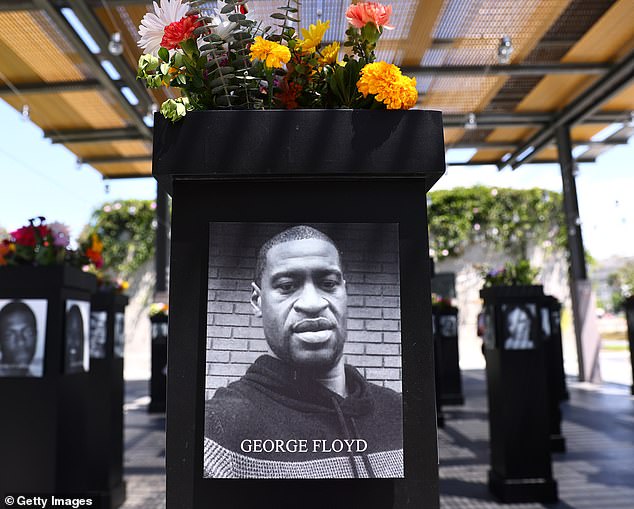Former police officer Derek Chauvin makes new bid to overturn conviction over the 2020 murder of George Floyd, claiming new evidence shows he didn’t cause his death
- Chauvin has asked a federal judge to throw out his 2021 conviction
- In his federal case, Chauvin accepted a plea deal in which he admitted responsibility for Floyd’s 2020 death
- He is now trying to provide evidence that Floyd’s cause of death was an alternative medical reason that has not previously been investigated.
Former Minneapolis police officer Derek Chauvin has filed a motion in federal court asking the judge who presided over his trial to vacate his conviction and order a new trial.
In the motion filed Monday, Chauvin argues that he would never have pleaded guilty to killing George Floyd if he had known about a Kansas pathologist’s theories.
The former police officer says Dr. William Schaetzel of Topeka believes Floyd died not of asphyxiation due to Chauvin’s applied force, but of complications from a rare tumor called a paraganglioma, which can cause a fatal adrenaline rush.
The pathologist, with whom Chauvin began communicating in February of this year, did not examine Floyd’s body but did review autopsy reports.
He told the Associated Press: “I can’t go to my grave knowing what I know. I just want the truth.
Chauvin, who filed the motion without an attorney, is asking for a new trial or at least an evidentiary hearing.
Former police officer Derek Chauvin is asking a federal judge to overturn his conviction in the death of George Floyd

His motion presents an alternative theory for Floyd’s cause of death, for which Chauvin took blame in a 2021 plea deal
The convicted former officer is serving a 21-year sentence in a federal prison in Arizona.
Chauvin further alleged that Schaetzel attempted to contact his trial attorney, Eric Nelson, as well as the judge and prosecution in his separate state court murder case in 2021.
He says Nelson never mentioned the pathologist or his theory. He also says Nelson has failed to challenge the constitutionality of the federal charge.
In his 2021 plea deal, Chauvin admitted that on May 25, 2020, he “intentionally violated Mr. Floyd’s constitutional right to be free from the use of unreasonable force by an officer.”
He specifically said he kept his left knee on Floyd’s neck, back and shoulder, and his right knee on Floyd’s back and arm.
The plea agreement stated that Floyd remained restrained, on his stomach and handcuffed on the ground for about 10 minutes and that Chauvin continued to use force even though he knew the suspect had stopped resisting, speaking or moving.
“Chauvin admitted that his intentional use of unreasonable force resulted in the bodily injury and death of Mr. Floyd because his actions impaired Mr. Floyd’s ability to obtain and maintain sufficient oxygen to sustain Mr. Floyd’s life to stand,” reads a memo from the DOJ’s Office of Public. Affairs.
He added that he failed to provide Floyd with medical aid even though he knew the victim was in serious medical distress. He admitted that his “failure to render medical assistance resulted in the bodily harm and death of Mr. Floyd.”
When Chauvin pleaded guilty to the federal indictment in December 2021, he waived his right to appeal except upon a claim of ineffective counsel.
A federal appeals court has twice denied Chauvin’s requests for a rehearing. He still is waiting for the US Supreme Court to decide whether it will hear his appeal of his murder conviction in state court.
